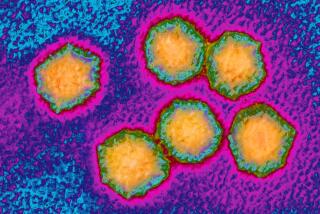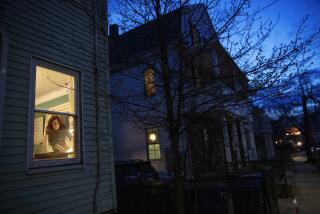50 in Texas being monitored for Ebola symptoms
Fifty people in Texas will be monitored daily for possible Ebola symptoms, including 10 who are considered at high risk because of their exposure to a patient now being treated for the deadly virus, public health officials said Friday.
The larger group includes healthcare workers and the ambulance team that brought the patient, Thomas Eric Duncan, to Texas Health Presbyterian Hospital in Dallas, where he has been in isolation and undergoing treatment since Sunday.
Included in the smaller group are four people who were in the apartment where Duncan stayed after his arrival from Liberia on Sept. 20.
The four -- a woman, her 13-year-old son and two adult nephews -- had been confined in the apartment. They were sent to a private home later in the day so they would have better quarters.
A hazardous-materials team had arrived Friday morning to clean the home.
Duncan is the first person to be diagnosed with Ebola in the United States. It is believed he contracted the virus in Liberia while helping to move a pregnant woman who later died. He then took a series of flights to visit family in Dallas.
Duncan first sought medical care at Texas Health Presbyterian on Sept. 25, but was given antibiotics and released. Three days later, he was taken by ambulance back to the hospital, where he remains in serious condition.
The case has raised questions about the public heath response and has prompted varying levels of fear among the general population, Dr. Anthony S. Fauci, director of the National Institute of Allergy and Infectious Diseases at the National Institutes of Health, acknowledged at a Friday afternoon briefing at the White House.
The areas of concern include Duncan’s passage through several airports, his initial treatment at the Dallas hospital and why local officials took days to clean the apartment where Duncan had stayed.
Responding to questions, Fauci agreed the local actions could be seen as “missteps,” but said he doubted there would be an outbreak of Ebola in the United States.
Sylvia Mathews Burwell, the secretary of Health and Human Services, said she understood the anxiety that even one case of Ebola could bring, but said the country had “the public health providers to contain the spread of this disease.”
Part of the confidence, officials in Washington said, is based on how local officials are seeking out those who may have been exposed. Since Duncan’s diagnosis, public health officials have been tracing all of his contacts, and their contacts as well. This week, state officials said they were looking at 100 people, with a core group of 12 to 18.
In their daily telephone briefing, officials from the Centers for Disease Control and Prevention, the state of Texas and Dallas County said they had winnowed the number down to about 50 who would need daily monitoring, including having their temperatures taken to detect fevers.
The tracers looked at direct contacts, indirect contacts, healthcare workers and laboratory technicians who may have handled blood.
“We cast a wide net, and we have decided on a group of people,” Texas Health Commissioner David Lakey told reporters. “We are not suggesting that we have a great deal of concerns about all of these people ... [but] we think it is prudent to check in with these people. We are being extremely cautious and careful.”
Dr. Beth Bell, director of the CDC’s National Center for Emerging and Zoonotic Infectious Diseases, said the monitoring would go on for 21 days, the time in which Ebola can appear after exposure to someone who is infectious. No symptoms have been reported so far, but she cautioned: “It is not outside the realm of possibility that we will have more Ebola cases here in the United States.”
While officials worked to reassure the public, the Ivy Apartments complex, where Duncan had stayed with family and friends, was a flurry of activity, as hazardous-material teams bagged materials from the unit he inhabited and brought them out.
Judge Clay Jenkins, the top elected administrator of Dallas County, said he and Dallas Mayor Mike Rawlings helped the family move to an undisclosed location in the city donated by an unidentified “faith friend.”
“Where they were living was a terrible place,” Rawlings said.
The new home has four bedrooms and space for children to play outside, Jenkins said.
“They were very glad to be going,” Jenkins said. “Our hope is they can have some peace and be left alone.
“I would want them treated as I would want my own family treated,” he said.
Officials said other residents at the complex had been stigmatized and threatened in recent days, with rocks thrown at an apartment overnight and some workers turned away from their jobs Friday.
Jenkins, who drove the group to their new home, thanked them for their perseverance and bravery, and attempted to quell community fears about the deadly disease’s spread.
“I am wearing the same shirt I was wearing when I was with that family,” he said, noting that he is married with a young daughter. “If there were any risk, I would not expose myself and my family.”
Rawlings said he had received assurances from public health officials that it was safe for Dallas residents to congregate as usual in coming days – at the state fair this weekend and National Night Out next week.
“We’ve got to get out and show the spirit of Dallas, Texas. We’re all a little anxious, but there is no fear in our eyes,” he said.
Meanwhile, the parents of an American freelance news cameraman diagnosed with Ebola in Africa said Friday that their son, Ashoka Mukpo, 33, was in good spirits and was preparing to move to Nebraska for treatment. He would be the fifth known American diagnosed with Ebola to be treated in the United States.
“Obviously he is scared and worried,” Dr. Mitchell Levy said of his son, who was hired just this week to be a cameraman in Liberia for NBC’s chief medical correspondent, Dr. Nancy Snyderman. Levy and his wife, Diana Mukpo, appeared on NBC’s “Today” show.
Elsewhere, officials at Howard University Hospital in Washington said Friday that they had admitted a patient who had symptoms that could be associated with Ebola after traveling to Nigeria. The case is one of at least a dozen possible Ebola exposures reported. All but Duncan’s have turned out to be false alarms.
Hennessy-Fiske reported from Dallas and Muskal from Los Angeles.
More to Read
Sign up for Essential California
The most important California stories and recommendations in your inbox every morning.
You may occasionally receive promotional content from the Los Angeles Times.











